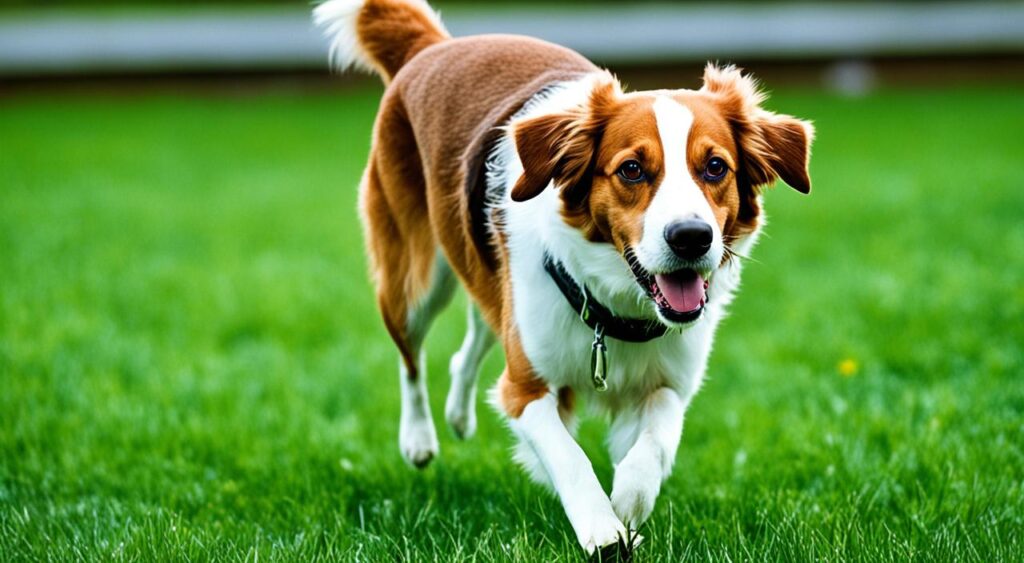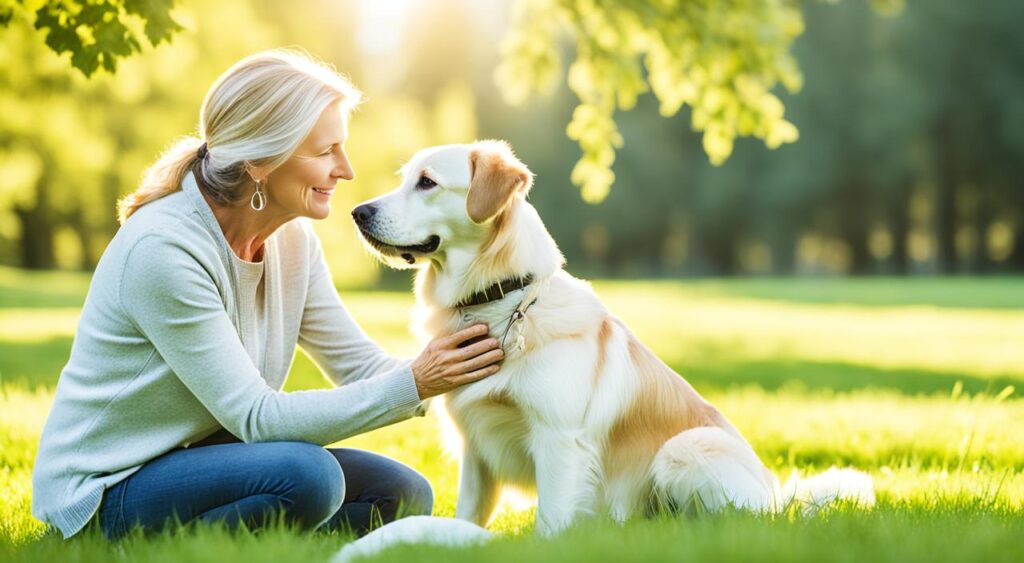
Many pet owners often wonder, “why do dogs eat grass?” It’s a common behavior seen in dogs. Understanding this is key for their health and well-being. Research shows that this behavior comes from their wolf ancestors and can also be due to dietary needs and curiosity.
Some dogs eat grass as a way to get extra nutrients. Others do it because they are bored or just exploring.
Studies show that dogs with stomach issues eat less grass. This means eating grass isn’t just a way to make themselves vomit, as some think. Knowing why your dog eats grass helps you see if it’s okay or if it means they’re not feeling well. So, figuring out why your dog eats grass is important for their health.
This article will explore why dogs eat grass and offer tips to keep their grass-eating safe and healthy.
Key Takeaways
- Dogs may eat grass due to instinctual behaviors inherited from their ancestors.
- A well-balanced diet may not always prevent dogs from eating grass.
- Potential health risks exist when dogs consume grass treated with pesticides or contaminated by fecal material.
- Understanding the context and frequency of grass consumption can help distinguish normal behavior from signs of health issues.
- Consulting a veterinarian is essential if you notice unusual behavior or signs of distress in your dog.
Understanding the Behavior of Dogs Eating Grass
Dogs eating grass can be puzzling for pet owners. This habit is common among all dogs and has several reasons. Exploring why dogs eat grass helps us understand their needs.
Many dogs eat grass because they like the taste. This comes from their wild ancestors, wolves, who ate the stomach contents of their prey. This included grass. Studies show many wolves still do this, linking it to their heritage.
Boredom can make dogs eat grass too. If a dog doesn’t get enough attention, it may chew on grass for fun. If a dog has an upset stomach, eating grass might help them vomit and feel better. But, only about 25% of dogs actually vomit after eating grass.
Some dogs eat grass because their diet lacks fiber. They do this to help with digestion. Instead, you can give them high-fiber foods like blueberries, carrots, and green beans.
Watch your dog for any signs of trouble from eating grass. While it’s usually safe, eating too much can cause stomach problems. Owners often talk to a vet about this. Knowing why dogs eat grass helps us manage it better.
For more info on similar behaviors, check out this helpful article.
Common Reasons for Dogs Eating Grass
Understanding why dogs eat grass can help pet owners make sense of their pets’ actions. Many factors lead to this behavior, showing how complex a dog’s instincts and needs are.
Instinctive Behavior from Ancestry
Dogs come from wild canids who ate plants as part of their diet. This behavior still shows up in domestic dogs, making them nibble on grass and other plants. It’s like they’re following their wild ancestors’ eating habits, looking for different nutrients like fiber.
Sourcing Missing Nutrients
Some dogs eat grass because they lack certain nutrients. A high-fiber diet can help fix this. For example, a study showed a miniature poodle stopped eating grass when it got more fiber in its diet. Dogs might eat plants to fill nutritional gaps they can’t get from their regular food.
Curiosity and Exploration
Dogs love to explore their world with their mouths. This can lead them to taste and chew grass. The fresh smell and feel of plants can make them want to do this. In fact, 79% of dogs with access to grass will eat it at some point.
Is it Safe for Dogs to Eat Grass?
Is it safe for dogs to eat grass? This question involves looking at health risks. Many dogs eat grass without problems. But, pet owners should think about a few health concerns.
Potential Risks of Grass Consumption
Eating a bit of grass is usually okay. But, grass consumption risks can happen if dogs eat too much or if the grass is dirty. Dogs might get upset stomachs, like vomiting or diarrhea, but this is rare.
It’s important to watch how much grass your dog eats. This helps avoid health problems.
Environmental Toxins and Pesticides
Another big worry is environmental toxins on grass. Many lawns have chemicals like pesticides or herbicides. These can hurt dogs if they eat them. This can cause serious health problems.
To keep your dog safe, don’t let them play where the grass has been sprayed with chemicals. This makes a safer place for them.
| Risk Factor | Description | Recommendation |
|---|---|---|
| Excessive Grass Eating | Can cause gastrointestinal upset, vomiting, or diarrhea. | Monitor your dog’s intake; limit access to grass. |
| Pesticide Exposure | Chemicals may poison dogs leading to serious health issues. | Avoid treated grass areas; check lawn chemicals. |
| Parasite Risk | Ingestion can expose dogs to parasites found in grass. | Regular vet checks; ensure deworming is up-to-date. |
Theories Surrounding Dog Eating Grass
Why do dogs eat grass? It’s a question that has puzzled many. Looking into the reasons, we see links between digestive upset and behavioral influences. Dogs eat grass for many reasons, and each dog is different.
Digestive Upset or Nausea
Research shows that not many dogs eat grass because they’re sick. In fact, only 8% of dogs feel unwell before eating grass. Many think grass makes dogs vomit, but that’s not always true.
Some believe dogs eat grass when they have digestive upset. But this idea isn’t accepted by all experts.
Behavioral Influences: Attention Seeking
Dogs might eat grass for attention. Owners often react when they see their dogs eating grass. This can make dogs think eating grass gets them attention.
This turns into a habit. Young dogs are more likely to eat grass because they’re curious. If you want to understand your dog’s habits, check out ways to encourage healthy eating.
Health Effects of Dogs Eating Grass
Dogs eating grass is common and usually not harmful. But, it can cause some health issues. It’s important to watch how your dog acts after eating grass.
Gastrointestinal Irritation
Some dogs may get upset stomachs from eating grass. This can lead to vomiting or diarrhea. A study showed that about 22% of dogs often vomit after eating grass.
If your dog shows these signs, you might need to change their diet. Or, you might need to talk to a vet about digestive supplements.
Intestinal Blockages
Eating too much grass can sometimes cause blockages in a dog’s intestines. These blockages can be very serious. Watch for signs like tiredness or not wanting to eat.
If you see these signs, get your dog to the vet right away. Dogs can have other stomach problems that make these issues worse. Make sure they don’t eat grass that has chemicals or pesticides on it.
To learn more about why dogs eat grass and how to handle it, check out this link.
| Health Effect | Symptoms | Recommended Action |
|---|---|---|
| Gastrointestinal Irritation | Vomiting, diarrhea, decreased appetite | Monitor behavior, consult a vet for dietary changes |
| Intestinal Blockages | Lethargy, abdominal pain, lack of appetite | Seek immediate veterinary care |
Determining If Your Dog’s Grass Eating is Normal
It’s important to understand your dog’s grass eating habits to know what’s normal. Look at how often they eat grass and the situations they do it in. Most of the time, eating a bit of grass is okay and just a normal thing dogs do. But, if your dog eats grass a lot, you should think about getting help.
Frequency and Context of Grass Consumption
Keep an eye on how often your dog eats grass to see if it’s normal or not. Dogs might eat grass sometimes, like when they’re playing or on walks. But, if they eat grass a lot, you should talk to a vet.
Signs of Underlying Health Issues
Watch for health signs if your dog eats a lot of grass. Things like vomiting, diarrhea, losing weight, feeling tired, or eating less could mean they’re sick. If your dog’s grass eating changes suddenly, they might have a health problem or not be getting enough nutrients. They should see a vet.

What Should I Do If My Dog Eats Grass?
Seeing your dog eat grass can make you wonder why they do it. It’s important to know how to react. By monitoring dog behavior, you can figure out why they might do this. If it seems related to health issues, consulting a veterinarian is key to keeping your dog healthy.
Monitoring Your Dog’s Behavior
Watching your dog closely is key. Notice how often and why they eat grass. Some dogs eat grass because they’re bored or stressed. This behavior, known as the dog eating grass response, can help you understand your dog better.
Consulting Your Veterinarian
If your dog shows signs of stomach trouble, like vomiting or eating less, get vet advice. A vet can check for serious issues like pancreatitis or inflammatory bowel disease. Getting help from a vet is important for your dog’s health.
How to Stop a Dog From Eating Grass
Learning how to manage your dog’s urge to eat grass can boost their health and happiness. It’s key to use strategies that discourage this habit and offer safe alternatives. Training is crucial; redirect your dog with commands like “leave it” or give them a toy to keep them focused. This approach helps curb the behavior and strengthens your connection.
Strategies to Discourage This Behavior
Training is just part of the solution. It’s vital to look into why your dog eats grass. Research shows that some dogs eat grass before showing signs of illness. This insight can help you spot when your dog is trying to tell you something.
If your dog eats grass due to anxiety or habit, a vet can offer advice and diet changes. For example, a small poodle stopped eating grass on a high-fiber diet after seven years.
Building a Safe Grazing Area
Creating a safe area for your dog to graze can also work well. Choose non-toxic grasses like Bermudagrass or Zoysiagrass for this space. This lets your dog indulge in natural grazing safely, while you can watch over them. These steps can greatly reduce grass eating and improve your dog’s life.
